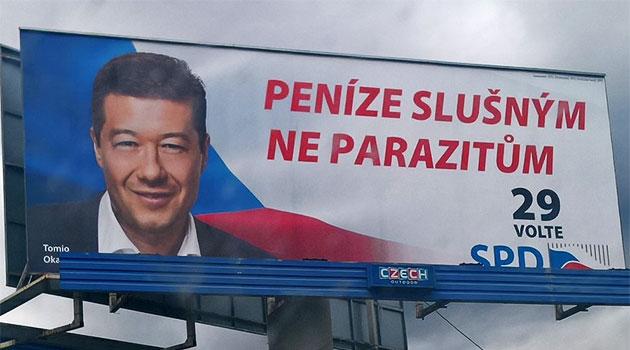Czech expert on extremism says solidarity through hate is very strong now

Racism in the Czech Republic is apparently not any more frequent now than it has been, but the perspective on what one is allowed to say in public has been altered, according to Jan Charvát, an expert on extremism at Charles University in Prague. Czech society, according to him, is undergoing a “reformatting” of what we consider normal and what not, and this flows from disappointment over developments post-1989.
Some of politicians exploiting that disappointment are Tomio Okamura and Czech President Miloš Zeman. “People have learned they can be vulgar on Facebook, they can abuse others in the worst possible way, which was not possible before – on the one hand because there was no Facebook, but even if there had been, they might never have said such things back then because the impression predominated that such things are simply not said. In any event, we live during an era when what we consider normal and what we consider abnormal is being reformatted. We now, apparently, are experiencing what people lived through, for example, in 1968 or 1989, which means a big societal transformation,” Charvát said in an interview for news server Aktuálně.cz.
According to Charvát, people in the Czech Republic had hope during the 1990s that their lives would improve and there was a shared idea that the country was heading in a certain direction. “We will tighten our belts, push off from this low point, and enter the European Union,” he described the series of steps that gave people the feeling they would be better off.
“After acceding to the EU, however, some problems began to pile up. Many people lost the feeling that the EU would solve all our problems for us and frequently, on the contrary, adjusted to the conviction that the EU is responsible for all that we dislike. The horizon of hope disappeared and was transformed into a kind of ball and chain,” the expert said, adding that in the interim a new, post-1989 generation has matured just as many people from the older generation have lost hope of living as well as they believed they would after 1989.
Chárvát belives divisions in society are intensifying. Referencing the President’s remarks in the context of a recent racially-motivated assault on a tram in Prague, he said that “[Zeman] is undoubtedly a person who has long systematically prmoted a certain attitude that intensifies societal divisions. This is an enormous problem because the President of the republic is belittling matters that are actually happening and that he just cannot minimize from that position. Speaking as a political scientist, I regret this. The President must simply say that it is not possible, in any way whatsoever, to make light of a racially motivated attack.”
The expert also describes the reasons for the success, in his view, of the populist, xenophobic Freedom and Direct Democracy Party (SPD) of Tomio Okamura. “After 2010 all the structures of the classic extreme right absolutely fell apart. Hammer Skins, Blood and Honour, he Národní odpor [National Resistance], the Autonomní nacionalisté [Autonomous Nationalists], nothing is left. Today when the neo-Nazi skinheads hold a concert, just 100 of them assemble. Practically nobody is interested in the Workers [Social Justice] Party, it’s a miniature affair,” he said.
In 2014 and 2015 the “We Do Not Want Islam in the Czech Republic” movement appeared on the Czech political scene, which the expert believes was the first to come forward since 1989 with ideas and a structure uncompromised by the old extreme right who were not classic neo-Nazis. “On that basis, Martin Konvička managed to build his movement, ‘Bloc against Islam’. His attempt at coordination with the ‘Dawn’ party, however, ended up as a fiasco. The only person who grew out of all that is Tomio Okamura. He gobbled up all the votes. He arrived on the scene with a specific program that seems left-wing to those on the ultra-right, but they support him because he is against Islam,” the expert said.
Unlike Konvička, who focused on the middle class, Charvát believes Okamura reached out to the worse-off members of the working class, the unemployed. “When Konvička burned out, [Okamura] took some of his votes too,” notes the expert.
Okamura bases his politics on disseminating hatred. “Solidarity through hatred is very strong, stronger than solidarity through positive affairs. By defining yourself as against a group that is generally condemned, you are able to demonstrate that you yourself are absolutely ok and that your values are the values of the larger society,” the expert explained.
